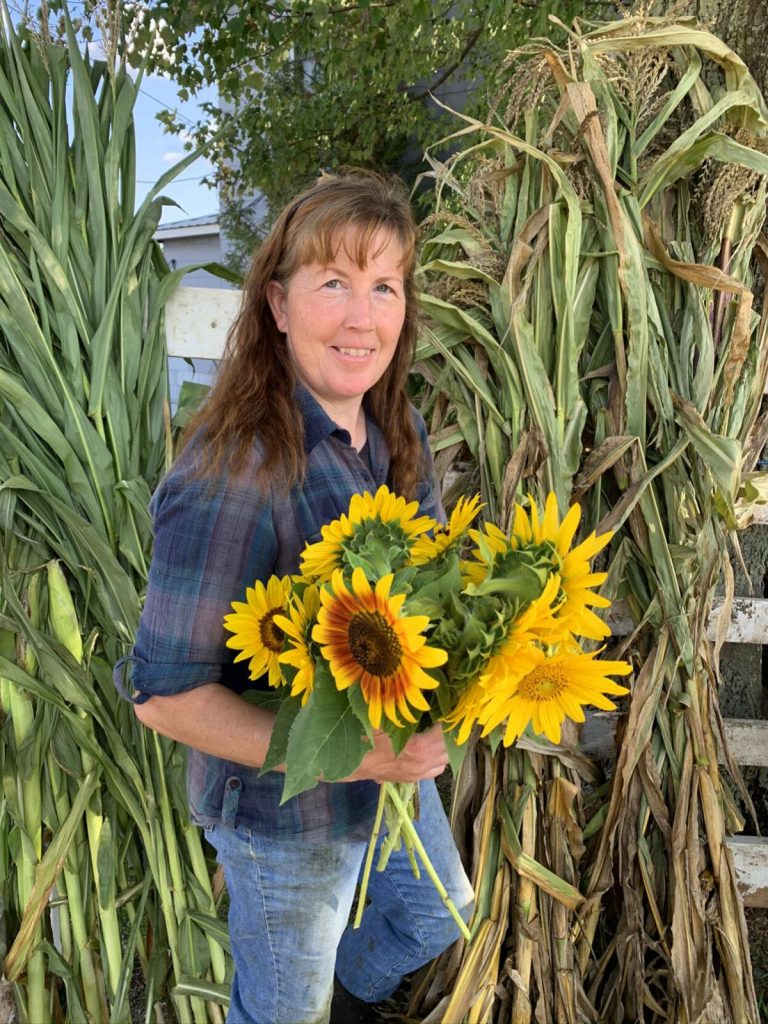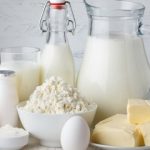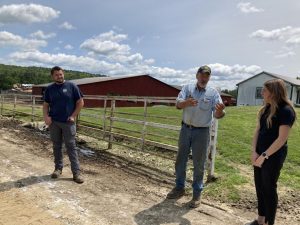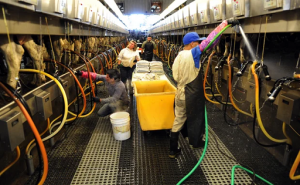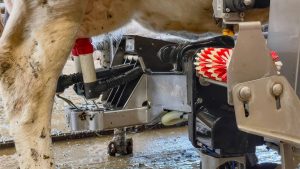
REYNOLDSVILLE — Holly and Kevin Plummer and their son Bryan Plummer spend their mornings and evenings making sure the cows get milked. Their other son, Kevin Jr. and his wife Erin also have their own farm and farm stand not far from Plum Hollow called Plummer Farms and Greenhouse.
Their son Bryan works full-time on the farm with them, and their daughter Sherry, who lives in Tennessee, often helps by running the farm’s social media pages.
“Kevin Jr. has his own place, so Sherry comes home to help when she’s available, she lives in Tennessee. He’s (Bryan) here full time, and he actually does all the produce, and then Kevin and I do the sweet corn, and then the rest is his,” Holly Plummer said.
Holly grew up on a farm in Lebanon County and Kevin grew up on a small farm in Johnstown. When they got married, they both worked on dairy farms, which later led them to want to start their own dairy farm.
“I was pretty much raised in a barn, I started milking cows as soon as I was able to walk,” Holly Plummer said. “We just decided we wanted to get our own. At the same time, my mom and dad were still farming, they had a dairy farm too, but they weren’t ready to retire, so we decided to get our own. The only thing we had were my 4-H show cows.”
Plum Hollow was started in the Summerville area in 1990 on a piece of land the family rented for their farm. They started with only five cows. Later, they started looking for land they could own for their farm, and moved in 2000 to where they are now in Reynoldsville
They are most well known for their sweet corn, and Holly Plummer said some of their customers followed them from their location in Ohl to Reynoldsville for the corn. She recently had their sweet corn sign out to retouch it, and had people stopping already to ask if it was ready to buy.
“Some people come up from out of state for the sweet corn. It went to Georgia and North Carolina last year, so it goes to different states,” Holly Plummer said.
Sherry Plummer starting the Facebook page has helped bring people from all over to the farm. Holly Plummer said the sweet corn depends on a number of factors like the weather and the area.
“I’d say probably 90 percent of people here are repeat customers. They keep coming back over and over. It might actually be more than 90 percent, especially with the sweet corn, once they get the sweet corn they can’t get enough of it,” Bryan Plummer said.
The Plummers stagger the planting of their sweet corn so that it becomes ripe in sections, making it last most of the summer for people to buy from them. Bryan Plummer said they plant the corn about every seven days for a two month period.
Since expanding the farm, Bryan Plummer has also expanded what produce they grow. They also recently were certified a PA Preferred farm.
“He expanded into the tomatoes and peppers, and he’s got a whole bunch of stuff planted,” Holly Plummer said.
Bryan Plummer said it’s especially satisfying to see their hard work in the fields whenever the crops turnout well. He and Holly said they have lost entire fields of corn during years where there is a drought.
“It hurts when stuff doesn’t do well. If you see a field of corn or something you planted and it doesn’t turn out, it hurts, but it’s so much better when it turns out right,” Bryan Plummer said.
All of the Plum Hollow milk goes to a cheese plant called Farmer’s Cheese, and is strictly sold commercially. They use four acres to grow the sweet corn their farm stand is known for, and the rest of the acreage is used to grow feed for their cows like hay and barley.
They would like to sell their milk, but said if they sell their milk privately, then commercial companies will be less likely to buy their milk. Bryan Plummer said this isn’t worth it for them because they wouldn’t be able to sell all their milk privately and would likely lose some of the 700 gallons a day they produce.
“If you lose your commercial market, there’s nowhere to ship your milk,” Bryan Plummer said.
They have 80 milk cows on the farm, 40 steers, and 60 heffers. Holly said between the two barns, they are kept very busy.
Recently, they started selling beef two years ago, and last year were selling steers because during COVID they had trouble getting rid of bull calves. They said this was really popular last year when people had trouble buying meat at the stores.
“We will keep a limited supply out here in this freezer,” Holly Plummer said. “Last year when the coronavirus hit, we couldn’t get rid of the bull calves so we started raising them for steers. You could buy them by the quarter, the half or the whole. A lot of people don’t have a big freezer, so we also sell whatever we have.”
She said they don’t sell any old cows, all of their steers are under two years old. She said they will continue this as long as there is a market for it. Now that meat is easier to get in the stores again, they have seen a slight slow down in customers for this.
“The problem is, especially in this area, you have to drive to a farm stand. Well, people go to a store and get everything they need, and that’s part of the problem,” Holly Plummer said.
The Plummers are a family full of farmers and are passionate about preserving farms in rural areas, as they have seen the decline in dairy farms in the area first hand.
“There’s a lot more to farming than what people actually think. They think you’re just out having fun, but it’s a business, it’s a life,” Holly Plummer said. “There’s getting to be fewer and fewer dairy farms, and I don’t think people realize there’s nobody taking over.”
